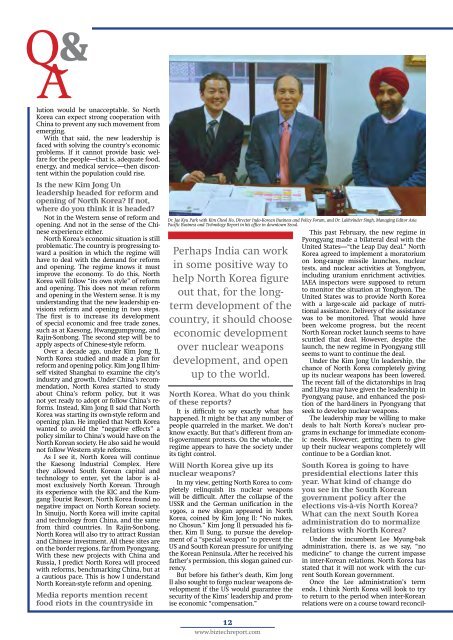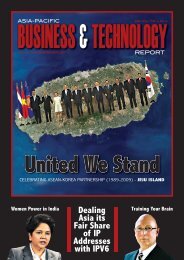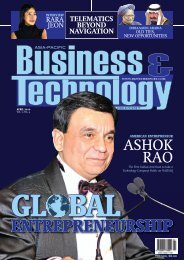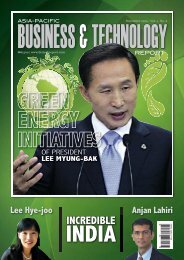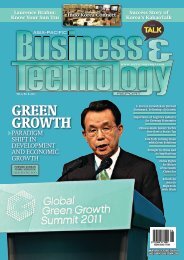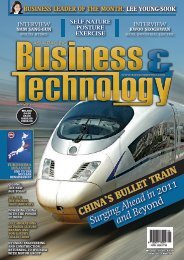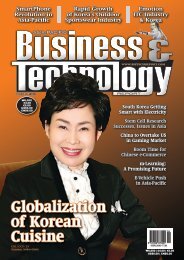INDIA-KOREA - Asia-Pacific Business and Technology Report
INDIA-KOREA - Asia-Pacific Business and Technology Report
INDIA-KOREA - Asia-Pacific Business and Technology Report
You also want an ePaper? Increase the reach of your titles
YUMPU automatically turns print PDFs into web optimized ePapers that Google loves.
Q<br />
a &<br />
lution would be unacceptable. So North<br />
Korea can expect strong cooperation with<br />
China to prevent any such movement from<br />
emerging.<br />
With that said, the new leadership is<br />
faced with solving the country’s economic<br />
problems. If it cannot provide basic welfare<br />
for the people—that is, adequate food,<br />
energy, <strong>and</strong> medical service—then discontent<br />
within the population could rise.<br />
Is the new Kim Jong Un<br />
leadership headed for reform <strong>and</strong><br />
opening of North Korea? If not,<br />
where do you think it is headed?<br />
Not in the Western sense of reform <strong>and</strong><br />
opening. And not in the sense of the Chinese<br />
experience either.<br />
North Korea’s economic situation is still<br />
problematic. The country is progressing toward<br />
a position in which the regime will<br />
have to deal with the dem<strong>and</strong> for reform<br />
<strong>and</strong> opening. The regime knows it must<br />
improve the economy. To do this, North<br />
Korea will follow “its own style” of reform<br />
<strong>and</strong> opening. This does not mean reform<br />
<strong>and</strong> opening in the Western sense. It is my<br />
underst<strong>and</strong>ing that the new leadership envisions<br />
reform <strong>and</strong> opening in two steps.<br />
The first is to increase its development<br />
of special economic <strong>and</strong> free trade zones,<br />
such as at Kaesong, Hwanggumpyong, <strong>and</strong><br />
Rajin-Sonbong. The second step will be to<br />
apply aspects of Chinese-style reform.<br />
Over a decade ago, under Kim Jong Il,<br />
North Korea studied <strong>and</strong> made a plan for<br />
reform <strong>and</strong> opening policy. Kim Jong Il himself<br />
visited Shanghai to examine the city’s<br />
industry <strong>and</strong> growth. Under China’s recommendation,<br />
North Korea started to study<br />
about China’s reform policy, but it was<br />
not yet ready to adopt or follow China’s reforms.<br />
Instead, Kim Jong Il said that North<br />
Korea was starting its own-style reform <strong>and</strong><br />
opening plan. He implied that North Korea<br />
wanted to avoid the “negative effects” a<br />
policy similar to China’s would have on the<br />
North Korean society. He also said he would<br />
not follow Western style reforms.<br />
As I see it, North Korea will continue<br />
the Kaesong Industrial Complex. Here<br />
they allowed South Korean capital <strong>and</strong><br />
technology to enter, yet the labor is almost<br />
exclusively North Korean. Through<br />
its experience with the KIC <strong>and</strong> the Kumgang<br />
Tourist Resort, North Korea found no<br />
negative impact on North Korean society.<br />
In Sinuiju, North Korea will invite capital<br />
<strong>and</strong> technology from China, <strong>and</strong> the same<br />
from third countries. In Rajin-Sonbong,<br />
North Korea will also try to attract Russian<br />
<strong>and</strong> Chinese investment. All these sites are<br />
on the border regions, far from Pyongyang.<br />
With these new projects with China <strong>and</strong><br />
Russia, I predict North Korea will proceed<br />
with reforms, benchmarking China, but at<br />
a cautious pace. This is how I underst<strong>and</strong><br />
North Korean-style reform <strong>and</strong> opening.<br />
Media reports mention recent<br />
food riots in the countryside in<br />
Dr. Jae Kyu Park with Kim Cheol Ho, Director Indo-Korean <strong>Business</strong> <strong>and</strong> Policy Forum, <strong>and</strong> Dr. Lakhvinder Singh, Managing Editor <strong>Asia</strong><br />
<strong>Pacific</strong> <strong>Business</strong> <strong>and</strong> <strong>Technology</strong> <strong>Report</strong> in his office in downtown Seoul.<br />
Perhaps India can work<br />
in some positive way to<br />
help North Korea figure<br />
out that, for the longterm<br />
development of the<br />
country, it should choose<br />
economic development<br />
over nuclear weapons<br />
development, <strong>and</strong> open<br />
up to the world.<br />
North Korea. What do you think<br />
of these reports?<br />
It is difficult to say exactly what has<br />
happened. It might be that any number of<br />
people quarreled in the market. We don’t<br />
know exactly. But that’s different from anti-government<br />
protests. On the whole, the<br />
regime appears to have the society under<br />
its tight control.<br />
Will North Korea give up its<br />
nuclear weapons?<br />
In my view, getting North Korea to completely<br />
relinquish its nuclear weapons<br />
will be difficult. After the collapse of the<br />
USSR <strong>and</strong> the German unification in the<br />
1990s, a new slogan appeared in North<br />
Korea, coined by Kim Jong Il: “No nukes,<br />
no Chosun.” Kim Jong Il persuaded his father,<br />
Kim Il Sung, to pursue the development<br />
of a “special weapon” to prevent the<br />
US <strong>and</strong> South Korean pressure for unifying<br />
the Korean Peninsula. After he received his<br />
father’s permission, this slogan gained currency.<br />
But before his father’s death, Kim Jong<br />
Il also sought to forgo nuclear weapons development<br />
if the US would guarantee the<br />
security of the Kims’ leadership <strong>and</strong> promise<br />
economic “compensation.”<br />
This past February, the new regime in<br />
Pyongyang made a bilateral deal with the<br />
United States—“the Leap Day deal.” North<br />
Korea agreed to implement a moratorium<br />
on long-range missile launches, nuclear<br />
tests, <strong>and</strong> nuclear activities at Yongbyon,<br />
including uranium enrichment activities.<br />
IAEA inspectors were supposed to return<br />
to monitor the situation at Yongbyon. The<br />
United States was to provide North Korea<br />
with a large-scale aid package of nutritional<br />
assistance. Delivery of the assistance<br />
was to be monitored. That would have<br />
been welcome progress, but the recent<br />
North Korean rocket launch seems to have<br />
scuttled that deal. However, despite the<br />
launch, the new regime in Pyongyang still<br />
seems to want to continue the deal.<br />
Under the Kim Jong Un leadership, the<br />
chance of North Korea completely giving<br />
up its nuclear weapons has been lowered.<br />
The recent fall of the dictatorships in Iraq<br />
<strong>and</strong> Libya may have given the leadership in<br />
Pyongyang pause, <strong>and</strong> enhanced the position<br />
of the hard-liners in Pyongyang that<br />
seek to develop nuclear weapons.<br />
The leadership may be willing to make<br />
deals to halt North Korea’s nuclear programs<br />
in exchange for immediate economic<br />
needs. However, getting them to give<br />
up their nuclear weapons completely will<br />
continue to be a Gordian knot.<br />
South Korea is going to have<br />
presidential elections later this<br />
year. What kind of change do<br />
you see in the South Korean<br />
government policy after the<br />
elections vis-à-vis North Korea?<br />
What can the next South Korea<br />
administration do to normalize<br />
relations with North Korea?<br />
Under the incumbent Lee Myung-bak<br />
administration, there is, as we say, “no<br />
medicine” to change the current impasse<br />
in inter-Korean relations. North Korea has<br />
stated that it will not work with the current<br />
South Korean government.<br />
Once the Lee administration’s term<br />
ends, I think North Korea will look to try<br />
to return to the period when inter-Korean<br />
relations were on a course toward reconcil-<br />
12<br />
www.biztechreport.com


